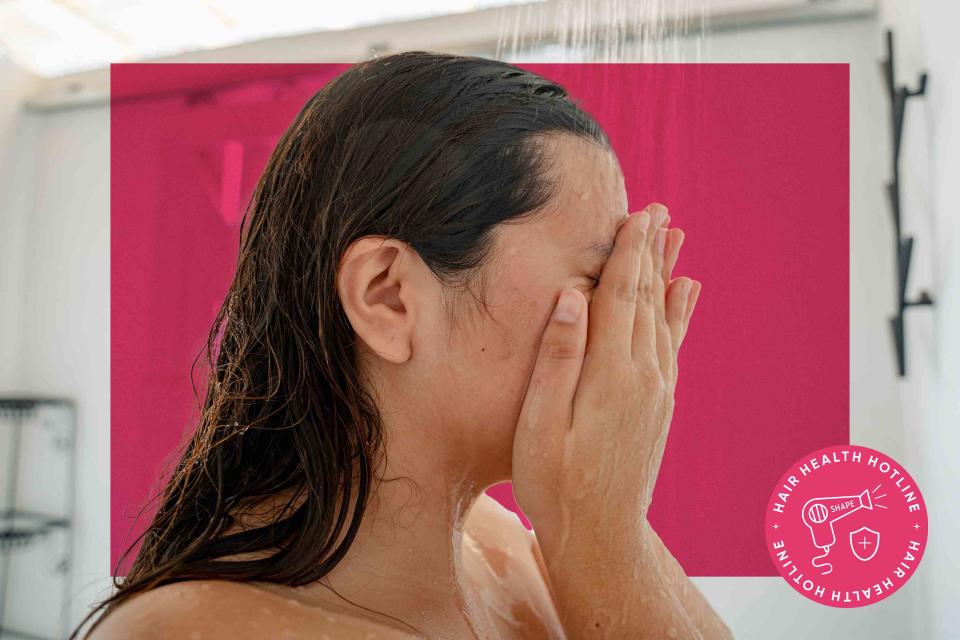Can a Cold Rinse Really Improve the Health of Your Hair?
Find out if shivering through your shower on wash day can actually do anything to help your strands or scalp.

Getty Images
Hair Health Hotline is your direct access to dermatologists, trichologists, hairstylists, and other beauty pros. Each story in this series tackles a common hair or scalp concern and offers science-backed solutions to care for your strands.
Ending a hair-washing session with a cold rinse has been a staple in many beauty routines for decades. This practice, passed down through generations, is loved for its many supposed hair benefits, including added shine and improved strength. But one can't help but wonder — does science really back up these beliefs?
To find out if there is more to this chilly finale than just the sometimes shocking sensation, we sought the insights of Harikiran Chekuri, MBBS, MS, a certified dermatologist, medical head of ClinicSpots, and founder of Redefine Clinic. Join us as we uncover the real effects of cold rinses on your hair and scalp and whether it’s worth adding this potentially beneficial step to your hair care routine.
Q: I’ve been told that after shampooing and conditioning my hair, I should do a final rinse with cold water. Is there really any benefit to this?
A: In short—yes. There is some truth to the benefits of cold water as far as hair is concerned. Rinsing your hair with cold water can benefit your hair's health and appearance, Dr. Chekuri says. Cold water also helps to close the hair cuticles, trapping moisture and nutrients while keeping out dirt and bacteria. This results in softer, smoother, shinier hair that is less prone to breakage or frizz. For those with color-treated hair, a cold rinse might also help extend the vibrancy of the dye.
Cold rinses also may enhance the overall health of your hair by promoting oxygen delivery (via blood circulation in the scalp), Dr. Chekuri adds. The overall result is not just healthier hair but also hair that's more manageable and easier to style in the long run — all reasons why turning down the temperature at the end of your wash may be totally worth it.
Related: Repair Damaged Hair With These Hair Care Tips From Pros
How Rinsing With Cold Water Impacts Scalp Health
Regarding the scalp, Dr. Chekuri indicates that cold water can reduce inflammation, irritation, and itching. It also balances the scalp's pH level, preventing issues like dandruff and infections, and soothes the scalp from the effects of heat, chemicals, and styling products. Cold water also helps regulate sebum (natural oil) production, which may be news to your ears if your hair tends to be oily.
Though there isn’t much research to back it, Dr. Chekuri also notes that many experts believe cold water helps stimulate blood flow to the scalp leading to follicle nourishment and hair growth, a concept loosely related to cold plunging post-workout rituals done by athletes. In these situations, cold water is used to improve the elasticity of blood vessels.
How Cold Water Impacts Effectiveness of Products
This simple rinse may also help seal in the beneficial properties of your products, ensuring that the moisturizing and nourishing ingredients from your conditioners and leave-in treatments are deeply embedded in your hair rather than being washed away, Dr. Chekuri explains. Cold water can even help preserve the active ingredients of the leave-in treatments, such as antioxidants, proteins, or vitamins, he adds. "[This] can make the hair more substantial and more resilient."
Drawbacks to Routinely Rinsing With Cold Water
The biggest drawback for cold water rinses may be the fact it can feel uncomfortable for some — especially during colder seasons or for those who are sensitive to cold temperatures in general. If you find yourself shivering through your shampooing session when incorporating cold rinses, you may have to think hard about whether it’s worth it for you.
Additionally, Dr. Chekuri notes cold water can also cause temporary constriction of the scalp capillaries, reducing blood flow and oxygen delivery. “To avoid this, use lukewarm water instead of freezing water and limit the duration and frequency of the cold rinses."
Bottom Line
The benefits of cold rinses in a hair care routine are multifaceted. However, the effectiveness and suitability can vary based on individual hair types, scalp conditions, and personal preferences. The ultimate goal is a balanced routine that caters to both your hair's health and your comfort.
Have a hair health question you want answered? Send your Q to hairhotline@shape.com for a chance to have it featured in a future installment of the Hair Health Hotline.
Related: How to Choose the Best Hair Growth Supplements, According to a Functional Medicine Doctor
For more Shape news, make sure to sign up for our newsletter!
Read the original article on Shape.

